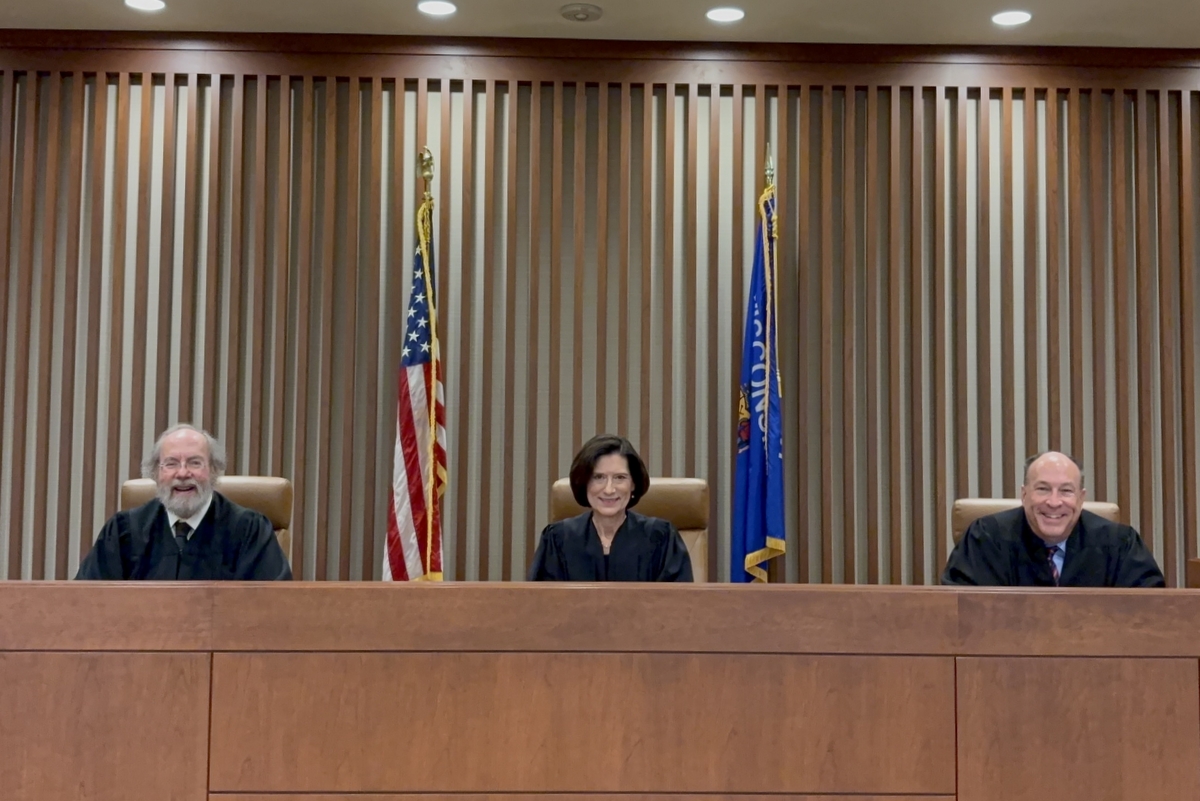
We would have welcomed the unusual opportunity for Eckstein Hall to serve for a day as a venue for the U.S. Court of Appeals for the Seventh Circuit in any circumstances. That the particular occasion—September 25, 2025—was during the final days of the tenure of the Hon. Diane S. Sykes, L’84, as the court’s chief judge, made Seventh Circuit Day “extra special” for the Marquette Law School community.
The memorable day this semester had multiple components, as we will seek to capture in a series of blog posts during the next couple of weeks. The main event was the six oral arguments that the court held, all in cases on appeal from a federal district court in Wisconsin. The panel consisted of Chief Judge Sykes, who presided; the Hon. Frank H. Easterbrook, a judge of the court since 1985; and the Hon. Michael B. Brennan, who joined the court in 2018. Without rivaling Chief Judge Sykes’s claim on us (or ours on her), the latter two judges are familiar to (and with) Marquette Law School: to give only one example for each of their connections, Judge Easterbrook spoke at the groundbreaking for Eckstein Hall in 2008, and Judge Brennan taught here as an adjunct faculty member in the 1990s.
Here follows, taken from its weekly session calendar, the court’s list of the cases argued in Marquette Law School’s Lubar Center on September 25 (together with the amount of argument time allocated to each side). Also included is a quotation from each appellant’s brief as to the issue presented; such a statement may not precisely capture what the court of appeals will end up regarding as “the issue” requiring decision, but it certainly will give a flavor of the case.
- Public Interest Legal Foundation, Inc. v. Meagan Wolfe, et al., No. 24-3258 (15 minutes per side):
-
- whether the district court “err[ed] when it decided that Congress needs no justification when it exercises its Elections Clause authority, U.S. Const. Art. I, § 4, cl. 1, to override the sovereignty of only some ”
- Aleksey Ruderman, et al. v. Kenosha County, et al., No. 24-2939 (15 minutes):
-
- whether the district court “erred in ruling that the TVPA [the Trafficking Victims Protection Act] does not apply to civilly detained immigrants forced to perform cleaning labor.”
- USA v. Edlando Watson, No. 24-2432 (15 minutes):
-
- whether “the government’s collection of the defendant’s DNA violate[d] the Fourth Amendment because the DNA warrant was the result of an earlier unlawful collection” and whether “18 U.S.C. § 922(g)(1) violate[s] the Second Amendment as applied to the defendant, a non-violent felon.”
- Appellee v. K.J., et al., No. 25-1046 (10 minutes):
-
- whether “a jury [could] reasonably find that K.J. and M.S. violated clearly established law by arranging to meet with Appellee and contacting him at his cell door, when Appellee specifically requested a meeting to discuss information about a fellow inmate who was facing criminal charges related to a corrections officer that was beaten at the Columbia County Jail” (i.e., a question of qualified immunity).
- Shareef Child v. Cheryl Webster, No. 24-1817 (15 minutes):
-
- “[w]hether Defendants’ refusal to distribute accurate prayer schedules violate[d] Childs’s rights under RLUIPA and the First Amendment’s Free Exercise Clause.”
- USA v. Michael Yumang, No. 24-2671 (10 minutes):
-
- whether the district court “den[ied] Yumang’s constitutional right to a public trial by closing the courtroom in order to recount the sidebar proceedings.”
The court has made an audio-recording of the oral arguments publicly available at this link; it is one long stream, including “blank space” or silence between the cases and during the breaks. Those breaks came after the second case and after the fourth, in order that students and others could enter or exit the Lubar Center for the next set of cases.
Several hundred individuals attended across the three pairs of arguments. These included more than 200 first-year Marquette law students, each of whose legal writing professors incorporated or drew on the briefs or oral arguments in the six cases. Others in attendance included scores of upper-level Marquette law students, such as many of those enrolled in the various sections of the Appellate Writing and Advocacy elective, as well as judicial interns and others eager to see the bench and bar at work.
Seventh Circuit Day, as we came to call it at Marquette Law School, was rather a collective triumph. To be sure, as with most things worth doing, the day required a good deal of work. Court personnel, beyond the judges, and Law School colleagues, almost numberless, did substantial work behind the scenes. As dean, I want to thank everyone who played a role in the day.
Please look during the next two weeks for additional blog posts, every other day, taking up aspects of Seventh Circuit Day, beyond the cases and the morning arguments. The written word will not be capable of capturing the entirety of the learning and lessons, but a record of a sort will help us recall the experience and others yet to benefit from it. The series will reflect something about the Marquette Law School community—including, not least, our gratitude.
